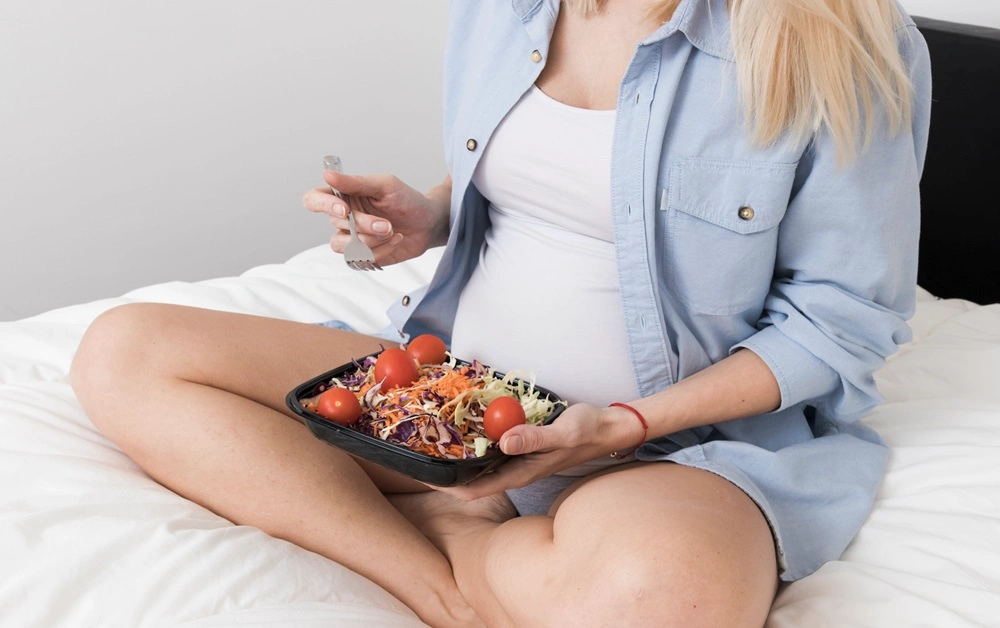Alongside tracking ovulation and managing stress, one of the things that you and your partner should focus on when you’re trying to get pregnant is what you put on the table. The foods you choose can either nourish your hopes or stand as quiet obstacles by negatively affecting your fertility.
Here are nine common foods that you may want to avoid to increase your chances of getting pregnant.
Trans fats
Compared to all kinds of fats, trans fats are considered the most dangerous to your body. They’re created through a process called hydrogenation, which turns liquid oils into solid fats to improve shelf life, and are commonly found in:
- Fried food
- Baked goods
- Processed snacks
If these make up your diet, trans fat can have the following effects on your body:
- Increased insulin resistance
- Increased ovulation-related issues in women, which can lead to infertility
- Decreased sperm count and sperm quality in men
High glycemic index foods
These foods, like sugary snacks and refined carbohydrates, can spike your blood sugar levels and lead to insulin resistance. This condition disrupts your hormonal balance and affects your ovulation or sperm quality, and thereby impacting fertility.
Unfermented soy products
Soy products contain phytoestrogens, which are plant-based compounds that can mimic estrogen in the body. If you’re a woman, consuming an extreme amount of soy products can disrupt your natural menstrual cycle, especially if you have ovulation issues.
Excessive alcohol
Consuming too much alcohol has negative effects on your health, including your fertility.
For men, excessive alcohol intake can lead to decreased sperm quality and quantity, while in women, it can cause ovulation disorders. Alcohol affects the levels of estrogen and testosterone, both of which are crucial hormones for reproductive processes.
Processed meats
Processed meats often contain high levels of:
- Saturated fats
- Trans fats
- Sodium
- Nitrates
If you consume processed meats regularly, your reproductive health may be affected due to:
- Inflammation
- Oxidative stress
- Hormonal imbalances
Most common processed meats include:
- Bacon
- Sausage
- Hotdogs
- Salami
- Ham
- Pepperoni
- Corned beef
- Canned meats
- Deli meats
In men, consuming large amounts of processed meats is associated with lower sperm count and reduced sperm motility. In women, these meats can disrupt normal ovulation cycles, which can pose as a challenge to becoming pregnant.
High-mercury fish
High-mercury fish are a concern when it comes to fertility because mercury is a toxic heavy metal that can have negative effects on reproductive health in both men and women. Mercury exposure, particularly from consuming certain types of fish, has been linked to:
- Reduced fertility
- Pregnancy complications
- Developmental problems in children
These fish include:
- Shark
- Swordfish
- King mackerel
- Marlin
- Bigeye tuna
- Tilefish
Caffeine
Consuming high levels of caffeine is associated with a higher risk of miscarriage. Studies suggest that limiting caffeine intake to less than 200 mg per day, roughly the amount found in one 12-ounce cup of coffee, can reduce the risk and support healthier fertility outcomes.
Sugar-sweetened beverages
Sugar-sweetened beverages, like sodas and energy drinks, can negatively affect fertility in both men and women. These drinks are linked to poor sperm quality in men and ovulatory disorders in women, which can potentially make conception more challenging.
Unpasteurized dairy and cheese
These products may contain harmful bacteria, such as listeria, which can lead to:
- Miscarriages
- Preterm births
- Stillbirth
- Neonatal listeriosis
What should you do instead?
Focus on a diet that limits these foods and incorporate plenty of the following:
- Fruits
- Vegetables
- Whole grains
- Lean proteins
Aside from food and nutrition, implement lifestyle changes to boost your fertility, including:
- Maintaining a healthy weight
- Limiting caffeine and alcohol
- Stopping smoking
- Exercising regularly in moderation
- Getting enough sleep
- Taking prenatal vitamins
- Monitoring and treating underlying conditions
Frequently asked questions
What foods should be avoided to enhance fertility?
Those who are aiming to boost fertility should limit their intake of processed meats, trans fats, and high-mercury fish. Emphasizing whole foods over processed options can positively impact reproductive health.
How does caffeine consumption affect fertility?
Moderate caffeine consumption may not significantly impact fertility, but high levels can. Limiting coffee to one or two cups per day is advisable for those trying to conceive.
Can soy products influence fertility levels?
Soy contains phytoestrogens, which can mimic estrogen in the body. For most people, moderate consumption does not harm fertility, but excessive intake may impact hormonal balance.
Are there any specific vegetables that should be avoided for fertility?
Most vegetables are beneficial for fertility, but non-organic varieties may have pesticide residues that can harm reproductive health. Washing produce thoroughly or choosing organic can mitigate these risks.
How does alcohol consumption affect the chances of conceiving?
Alcohol can negatively affect both male and female fertility. Reducing alcohol intake can improve the likelihood of conception and support overall reproductive health.
Key takeaway
When you’re trying to conceive, see to it that you maintain a balanced and nutrient-rich diet. Avoiding foods like trans fats, processed meats, high-mercury fish, and excessive alcohol can improve both male and female fertility by supporting hormone balance and reproductive health.
Along with dietary changes, adopting healthy lifestyle habits such as regular exercise, proper sleep, and limiting caffeine can further boost your chances of conceiving.
Increase your chances of conceiving with our ovulation test here.




















































